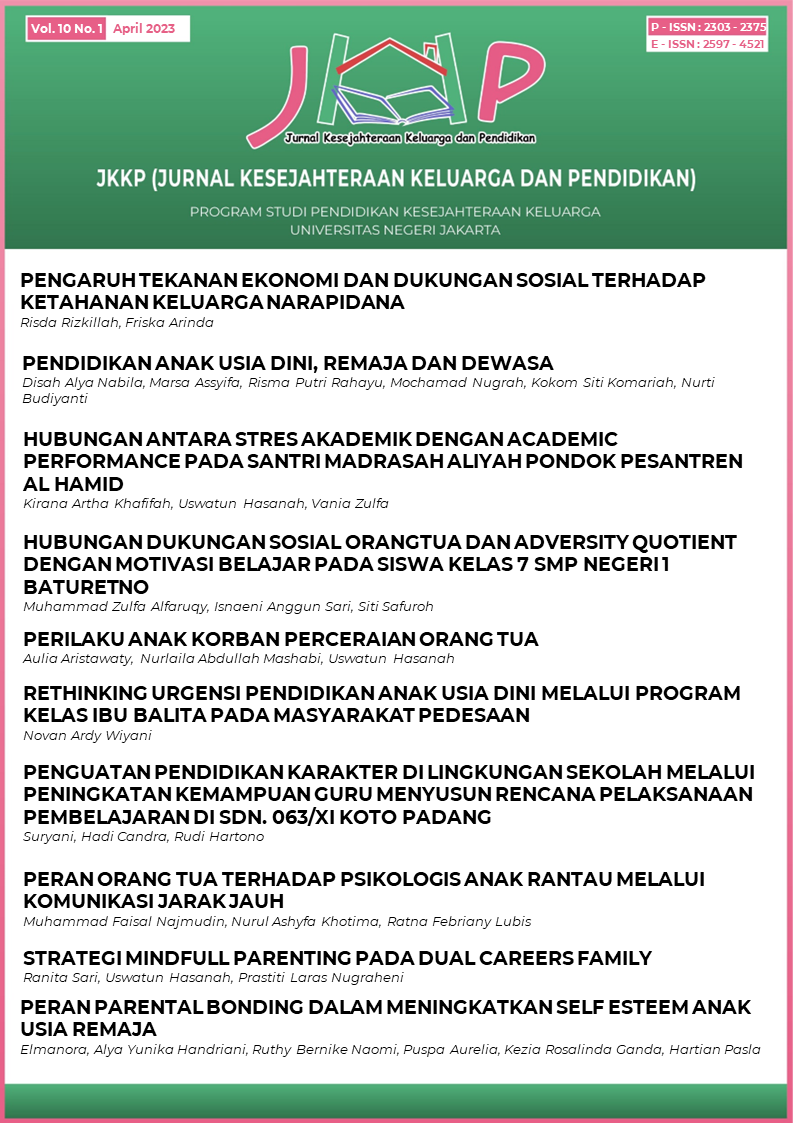PERAN PARENTAL BONDING DALAM MENINGKATKAN SELF-ESTEEM PADA ANAK USIA REMAJA
DOI:
https://doi.org/10.21009/JKKP.101.10Keywords:
parental bonding, remaja, self-esteemAbstract
Abstrak
Penelitian ini bertujuan untuk menganalisis pengaruh parental bonding terhadap self-esteem pada anak usia remaja. Penelitian ini menggunakan desain cross-sectional dan pendekatan kuantitatif asosiatif. Pengambilan data dilakukan pada tahun 2022 di wilayah Jakarta. Responden dalam penelitian ini adalah 81 orang anak usia remaja yang dipilih dengan menggunakan teknik purposive sampling. Penelitian ini mengumpulkan data karakteristik responden, parental bonding, dan self-esteem. Instrumen pengukuran variabel penelitian terdiri atas 25 butir untuk variabel parental bonding dan 10 butir untuk variabel self-esteem. Setiap pernyataan terdiri atas empat pilihan tanggapan, yaitu sangat setuju, setuju, tidak setuju, dan sangat tidak setuju. Pengolahan data dilakukan dengan menggunakan statistika deskriptif dan uji regresi linear sederhana. Hasil penelitian menunjukkan bahwa self-esteem remaja termasuk dalam kategori sedang. Remaja juga memiliki tingkat kedekatan dengan orang tuanya dalam kategori sedang. Hasil uji regresi linear sederhana menunjukkan bahwa parental bonding berpengaruh signifikan terhadap self-esteem remaja (β=0,763, p<0,01). Berdasarkan hasil tersebut, parental bonding dapat meningkatkan self-esteem pada anak usia remaja. Semakin dekat hubungan antara orang tua dengan anak usia remaja maka semakin baik self-esteem yang dimiliki oleh anak. Dengan demikian, peningkatan kedekatan antara orang tua dan anak dapat menjadi solusi untuk meningkatkan self-esteem pada anak, terutama anak usia remaja.
Abstract
This study aims to analyze the effect of parental bonding on self-esteem in adolescent children. This study used a cross-sectional design and an associative quantitative approach. Data collection be done in 2022 in the Jakarta area. Respondents in this study were 81 adolescents who were selected using a purposive sampling technique. This study collected data on respondent characteristics, parental bonding, and self-esteem. The research variable measurement instrument comprised 25 parental bonding items and ten self-esteem items variables. Each statement has four response options: strongly agree, agree, disagree, and strongly disagree. Data processing uses descriptive statistics and simple linear regression tests. The study results show that adolescent self-esteem is in the medium category. Teenagers also have a level of closeness with their parents in the medium category. The simple linear regression test results show that parental bonding significantly affects adolescent self-esteem (β=0.763, p<0.01). Based on these results, parental bonding can increase self-esteem in adolescent children. The closer the relationship between parents and adolescents, the better the child's self-esteem. Thus, increasing the closeness between parents and children can be a solution to increase self-esteem in children, especially teenagers.
Downloads
Published
Issue
Section
License
Copyright (c) 2025 Elmanora Elmanora, Alya Yunika Handriani, Ruthy Bernike Naomi, Puspa Aurelia, Kezia Rosalinda Ganda, Hartian Pasla

This work is licensed under a Creative Commons Attribution-ShareAlike 4.0 International License.
Authors who publish with this Journal agree to the following terms:
- Author retain copyright and grant the journal right of first publication with the work simultaneously licensed under a creative commons attribution licensethat allow others to share the work within an acknowledgement of the work’s authorship and initial publication of this journal.
- Authors are able to enter into separate, additional contractual arrangementfor the non-exclusive distribution of the journal’s published version of the work (e.g. acknowledgement of its initial publication in this journal).
- Authors are permitted and encouraged to post their work online(e.g. in institutional repositories or on their websites) prior to and during the submission process, as it can lead to productive exchanges, as well as earlier and greater citation of published works.
Users/public use of this website will be licensed to CC BY SA
![]()







